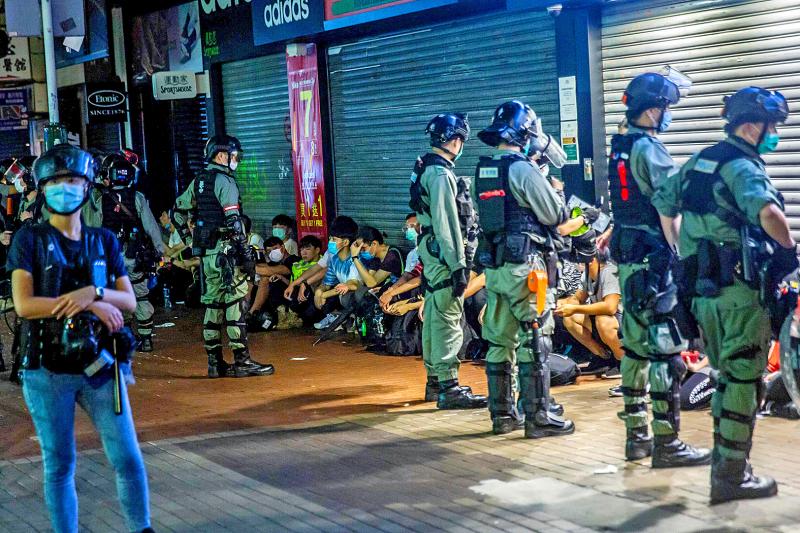Hong Kong’s government is to give “priority” to a contentious bill that seeks to criminalize abuse of the Chinese national anthem, Hong Kong Chief Executive Carrie Lam (林鄭月娥) said yesterday, days after a pro-Beijing lawmaker wrested control over a key committee that vets bills.
The proposed law is aimed at ensuring that Hong Kong residents respect China’s national anthem. Under the bill, those who use the anthem for commercial purposes, or publicly and intentionally insult the anthem, such as booing it during soccer games, could face fines of up to HK$50,000 (US$6,451) and up to three years in prison.
The move comes as differences between the pro-Beijing and pro-democracy camps in Hong Kong were sharpened during months-long protests last year that were sparked by an attempt to pass a bill that would have allowed suspects to be extradited to mainland China to face trials. That bill was eventually withdrawn.

Photo: AFP
Lam said the chief secretary and other officials have written to Hong Kong Legislator Starry Lee (李慧瓊), who has inserted herself as chair of the Legislative Council’s House Committee — which scrutinizes bills and decides when they can be sent for a final vote — to consult with her on the resumption of second readings of bills.
“Two of the bills have been delayed for a very long time, and they are the national anthem bill and the patents amendment bill,” Lam told a news conference. “So we do expect these two bills to be given priority in the resumption of second readings by the Legislative Council.”
The anthem bill was first proposed in January last year, after Hong Kong spectators jeered at the Chinese national anthem during several high-profile, international soccer matches in 2015.
Separately, Hong Kong Police Commissioner Chris Tang (鄧炳強) yesterday said that his officers should have been more professional in dealing with media during protests at which journalists were pepper-sprayed and made to kneel in a cordoned-off area.
Police arrested about 230 people at the Sunday protests in which hundreds gathered in shopping malls to sing and chant pro-democracy slogans, defying a ban on groups of more than eight, aimed at reining in the spread of COVID-19.
“Regarding the media experience on that day, I also think it’s undesirable,” Tang told a district council meeting. “I think we need to review, and even look into, what happened at that time. I also think we should have been more professional.”
Police had fired pepper spray and run stop-and-search operations on the public and media, with the Hong Kong Journalists’ Association saying filming by some media was blocked.
Video images posted online showed police pushing journalists, as well as dozens of people, some in yellow vests with press markings, being forced to kneel on a sidewalk behind a police cordon.

GEARING UP: An invasion would be difficult and would strain China’s forces, but it has conducted large-scale training supporting an invasion scenario, the report said China increased its military pressure on Taiwan last year and took other steps in preparation for a potential invasion, an annual report published by the US Department of Defense on Wednesday showed. “Throughout 2023, Beijing continued to erode longstanding norms in and around Taiwan by employing a range of pressure tactics against Taiwan,” the report said, which is titled “Military and Security Developments Involving the People’s Republic of China (PRC) 2024.” The Chinese People’s Liberation Army (PLA) “is preparing for a contingency to unify Taiwan with the PRC by force, if perceived as necessary by Beijing, while simultaneously deterring, delaying or denying

PEACEFUL RESOLUTION: A statement issued following a meeting between Australia and Britain reiterated support for Taiwan and opposition to change in the Taiwan Strait Canada should support the peaceful resolution of Taiwan’s destiny according to the will of Taiwanese, Canadian lawmakers said in a resolution marking the second anniversary of that nation’s Indo-Pacific strategy on Monday. The Canadian House of Commons committee on Canada-Chinese relations made the comment as part of 34 recommendations for the new edition of the strategy, adding that Ottawa should back Taiwan’s meaningful participation in international organizations. Canada’s Indo-Pacific Strategy, first published in October 2022, emphasized that the region’s security, trade, human rights, democracy and environmental protection would play a crucial role in shaping Canada’s future. The strategy called for Canada to deepen

TECH CONFERENCE: Input from industry and academic experts can contribute to future policymaking across government agencies, President William Lai said Multifunctional service robots could be the next new area in which Taiwan could play a significant role, given its strengths in chip manufacturing and software design, Taiwan Semiconductor Manufacturing Co (TSMC, 台積電) chairman and chief executive C.C. Wei (魏哲家) said yesterday. “In the past two months, our customers shared a lot of their future plans with me. Artificial intelligence [AI] and AI applications were the most talked about subjects in our conversation,” Wei said in a speech at the National Science and Technology Conference in Taipei. TSMC, the world’s biggest contract chipmaker, counts Nvidia Corp, Advanced Micro Devices Inc, Apple Inc and

LEAP FORWARD: The new tanks are ‘decades more advanced than’ the army’s current fleet and would enable it to compete with China’s tanks, a source said A shipment of 38 US-made M1A2T Abrams tanks — part of a military procurement package from the US — arrived at the Port of Taipei early yesterday. The vehicles are the first batch of 108 tanks and other items that then-US president Donald Trump announced for Taiwan in 2019. The Ministry of National Defense at the time allocated NT$40.5 billion (US$1.25 billion) for the purchase. To accommodate the arrival of the tanks, the port suspended the use of all terminals and storage area machinery from 6pm last night until 7am this morning. The tanks are expected to be deployed at the army’s training